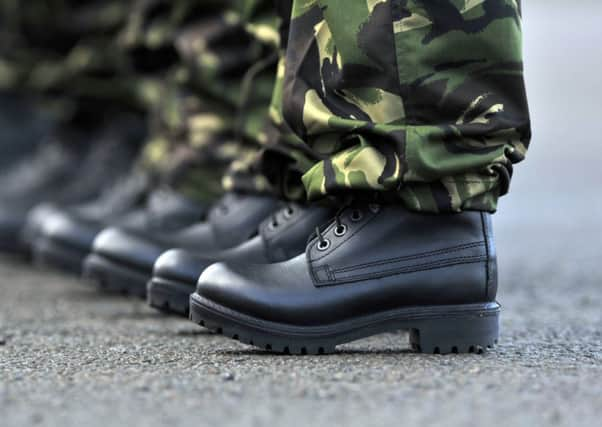Case for Yes: Independence can boost Scots military


Could Scotland afford its defence?
The development of a newly independent Scotland’s defence infrastructure would be underpinned by Scotland’s 8.4 per cent population share of UK defence assets. In 2012-13, those assets were valued at £92.28 billion. In the aftermath of a Yes vote, Scottish negotiators would therefore approach discussions with Ministry of Defence (MoD) officials looking to secure the transfer of military equipment, infrastructure and – where appropriate, cash – to the value of around £7.75bn.
Advertisement
Hide AdAdvertisement
Hide AdThis substantial sum would fund the initial development of Scotland’s defence infrastructure. It would also underwrite commitments such as Scotland’s contribution to the cost of removing Trident. Lastly, it would fund the procurement of key equipment for Scottish defence forces such as naval vessels and aircraft.
What would it cost annually to maintain an independent Scotland’s defence? Currently, Scottish taxpayers contribute more than £3bn per year to the UK defence budget. This is more than nations such as Denmark and Finland spend annually on defence. The Scottish Government intends dedicating £2.5bn annually to national defence, a figure similar to that of Denmark. It is reasonable to assume that Scotland could develop a Danish-scale military force structure for itself on this budget, one tailored to Scotland’s requirements.
Under the Scottish Government’s plans, it seems that defence would make lesser demands on Scottish taxpayers than current UK arrangements. Furthermore, a Scottish defence budget would not be drained by big-ticket items such as nuclear weapons and £3bn aircraft carriers. Lastly, we might consider the implications of having a Scottish defence establishment based in Scotland and staffed by salaried personnel who are overwhelmingly resident (and spending) in Scotland.
What would a Scottish Defence Force look like and what would it do?
The Scottish Government’s plans for a Scottish defence force have undoubtedly been influenced by the Nordic militaries. What is depicted is a modestly sized but capable military force, with emphasis placed upon maritime and aerial capability. This makes sense given that Scotland is a maritime nation, with a sea area more than five times larger than its land area. Scottish troop numbers would build towards a force of 20,000 over ten years, comprising 15,000 regulars and 5,000 reservists.
What would Scottish military forces do? An independent Scotland would be a member of the UN, the EU and possibly Nato; this could mean any number of possible commitments. However, the priority would be defending domestic interests. Increased shipping traffic through the Northern Sea Route requires a greater commitment to the monitoring of Scotland’s coastline and seas; the smuggling of goods, weapons and people is rife across the British Isles, meriting greater attention than it currently receives.
On these domestic duties alone, Scottish air, naval and coastguard services would be busy. Looking beyond Scotland’s environs, further opportunities would beckon. An independent Scotland would be viewed by the UN as an ideal candidate for contributing to international peacekeeping missions. Involvement in such missions would provide invaluable operational experience for Scottish military forces; it would also demonstrate Scotland’s credentials as a “good citizen” within the international community. Scotland’s contribution need not reside solely in peacekeeping. For example, a Scottish navy could contribute to multinational anti-piracy operations in international waters.
Would independence mean a loss of “global clout”?
Those speaking for the UK Government regularly warn that an independent Scotland would miss the “global clout” of the UK. Recent years have shown the weakness of these assertions. The UK has in fact negligible capacity to steer the course of international affairs. In those areas where it can exert influence – for example in the EU – it may soon willingly surrender its “clout”.
Advertisement
Hide AdAdvertisement
Hide AdIn fact, whilst UK officials frequently refer to “global clout”, most national governments do not speak in this way. The more typical approach reflects the belief that a nation’s influence – ie being listened to and being able to enact constructive change within the international arena – is most evident and least divisive when it manifests itself through consensus-building and multilateral action.
These approaches would define an independent Scotland’s international outreach. However, this does not mean that Scotland would be denied the opportunity to act unilaterally. For example, in 2013, Luxembourg was the most generous international state donor of humanitarian assistance; Sweden was the second. This type of commitment may not demonstrate “global clout” as some appear to define it but it is just one example of how Scotland could decide to prioritise its foreign affairs agenda and take distinctive decisions which have international impact.
Ultimately, it would not be “loss” which would define Scotland’s experience of independence. Scotland and the UK would – necessarily – continue to have a multifaceted and mutually self-interested relationship. Through membership of the EU and Nato, Scotland would have a voice in two of the world’s major regional transnational institutions.
An independent Scotland would be a more modest military actor than the UK but it would nonetheless have the capacity to defend itself in an uncertain global environment. It could also, however modestly, work with other nations in helping to shape that environment for the better.
DEFENCE PLANS AT A GLANCE
• Military structure - Norwegian-Danish inspired – emphasis on maritime and aerial capability, building to 20,000 troops over ten years.
• Affordability - Infrastructure development and procurement of military assets funded by multi-billion-pound inherited share of UK defence assets; Annual running costs equivalent to Denmark’s, savings for Scotland’s taxpayers; Significant proportion of annual Scottish defence budget spent in Scotland
• Activities - Domestic: maritime and aerial patrol, shipping safety, customs enforcement; International: UN, EU and possible Nato missions,
possible emphasis on peacekeeping; Independent Scotland would have a voice in major international institutions and could prioritise its foreign affairs agenda
• Dr John MacDonald is Director of the independent think-tank Scottish Global Forum